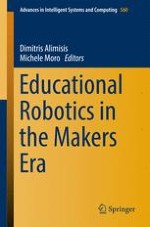2017 | OriginalPaper | Buchkapitel
A Scenario-Based Approach for Designing Educational Robotics Activities for Co-creative Problem Solving
verfasst von : Vassilis Komis, Margarida Romero, Anastasia Misirli
Erschienen in: Educational Robotics in the Makers Era
Aktivieren Sie unsere intelligente Suche, um passende Fachinhalte oder Patente zu finden.
Wählen Sie Textabschnitte aus um mit Künstlicher Intelligenz passenden Patente zu finden. powered by
Markieren Sie Textabschnitte, um KI-gestützt weitere passende Inhalte zu finden. powered by
